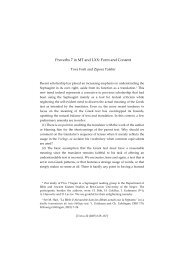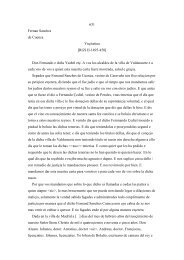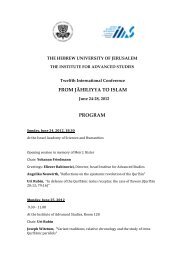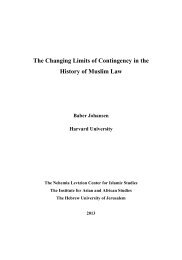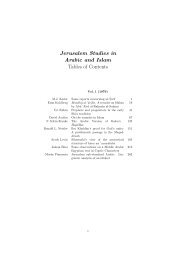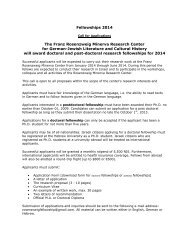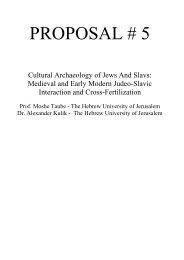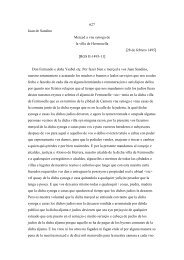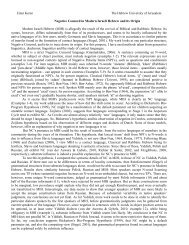Proverbs 7 in MT and LXX: Form and Content
Proverbs 7 in MT and LXX: Form and Content
Proverbs 7 in MT and LXX: Form and Content
Create successful ePaper yourself
Turn your PDF publications into a flip-book with our unique Google optimized e-Paper software.
<strong>Proverbs</strong> 7 <strong>MT</strong> <strong>and</strong> <strong>LXX</strong> 131<br />
(6) An <strong>in</strong>dependent evaluation of the mean<strong>in</strong>g of the Greek text is hardly<br />
recommendable. One should first consider the language, structure, literary<br />
devices, mean<strong>in</strong>g <strong>and</strong> problems of the parent text before prob<strong>in</strong>g <strong>in</strong>to the<br />
work of the translator <strong>in</strong> an attempt to evaluate his <strong>in</strong>tended message. We<br />
should be very careful <strong>in</strong> attribut<strong>in</strong>g far-reach<strong>in</strong>g <strong>in</strong>tentions to the<br />
translator, who usually strives to render his source <strong>in</strong> a reasonable form.<br />
(7) Once the mean<strong>in</strong>g of the Greek text has been discerned, the translator’s<br />
<strong>in</strong>terpretation should not be imported <strong>in</strong>to the Hebrew text. This last<br />
procedure <strong>in</strong>volves a contradiction <strong>in</strong> terms, s<strong>in</strong>ce, if the Greek has its own<br />
<strong>in</strong>ternal literary truth, this truth belongs with<strong>in</strong> the Greek <strong>and</strong> should not be<br />
applied to another literary work whose mean<strong>in</strong>g derives from its own<br />
makeup.<br />
All these tenets become quite difficult to follow as one approaches a<br />
translation of the sort of <strong>Proverbs</strong>-<strong>LXX</strong>. The translator of <strong>Proverbs</strong>, unlike<br />
the majority of <strong>LXX</strong> translators, is a self-conscious writer. 4 He is aware of<br />
the needs <strong>and</strong> possibilities of the target language, often rewrit<strong>in</strong>g his Vorlage<br />
<strong>in</strong> order to create an eloquent Greek text. He is also notorious for<br />
<strong>in</strong>troduc<strong>in</strong>g his own milieu <strong>in</strong>to the text. Does he, nevertheless, rema<strong>in</strong><br />
with<strong>in</strong> the limits set by the str<strong>in</strong>gs that b<strong>in</strong>d him to the Vorlage? The attitude<br />
towards the translator of <strong>Proverbs</strong> has changed over time. While<br />
commentators <strong>in</strong> the 18th-19th centuries felt obliged to anchor every<br />
difference between the <strong>MT</strong> <strong>and</strong> the <strong>LXX</strong> <strong>in</strong> possible different read<strong>in</strong>gs, 5<br />
4 Thackeray lists <strong>LXX</strong>-Prov under “Paraphrases <strong>and</strong> free render<strong>in</strong>gs,” together<br />
with I Esdras, Daniel, Esther <strong>and</strong> Job (H. St. John Thackeray, A Grammar of the Old<br />
Testament <strong>in</strong> Greek [Cambridge, 1909] 13). This evaluation is carried even farther by<br />
D.M. Hamonville, Les Proverbes (La Bible d’Alex<strong>and</strong>rie 17; Paris, 2000) 19, who<br />
asserts that the translator of <strong>Proverbs</strong> exercises a freedom <strong>in</strong>comparable to any other<br />
<strong>LXX</strong>-translator, as proven by the quality of his language, unbound to either his<br />
Vorlage or the conventions of the <strong>LXX</strong> (about 150 hapax legomena with<strong>in</strong> the <strong>LXX</strong>).<br />
5 Thus, J.G. Jäger, Observationes <strong>in</strong> Proverbium Salomonis Versionem Alex<strong>and</strong>r<strong>in</strong>am<br />
(Meldorf, 1788), cited passim by Lagarde <strong>and</strong> Baumgartner; P. de Lagarde,<br />
Anmerkungen zur griechischen Übersetzung der Proverbien (Leipzig, 1863); A.J.<br />
Baumgartner, Étude critique sur l’état du texte du livre des Proverbes d’apres les<br />
pr<strong>in</strong>cipales traductions anciennes (Leipzig, 1890).




